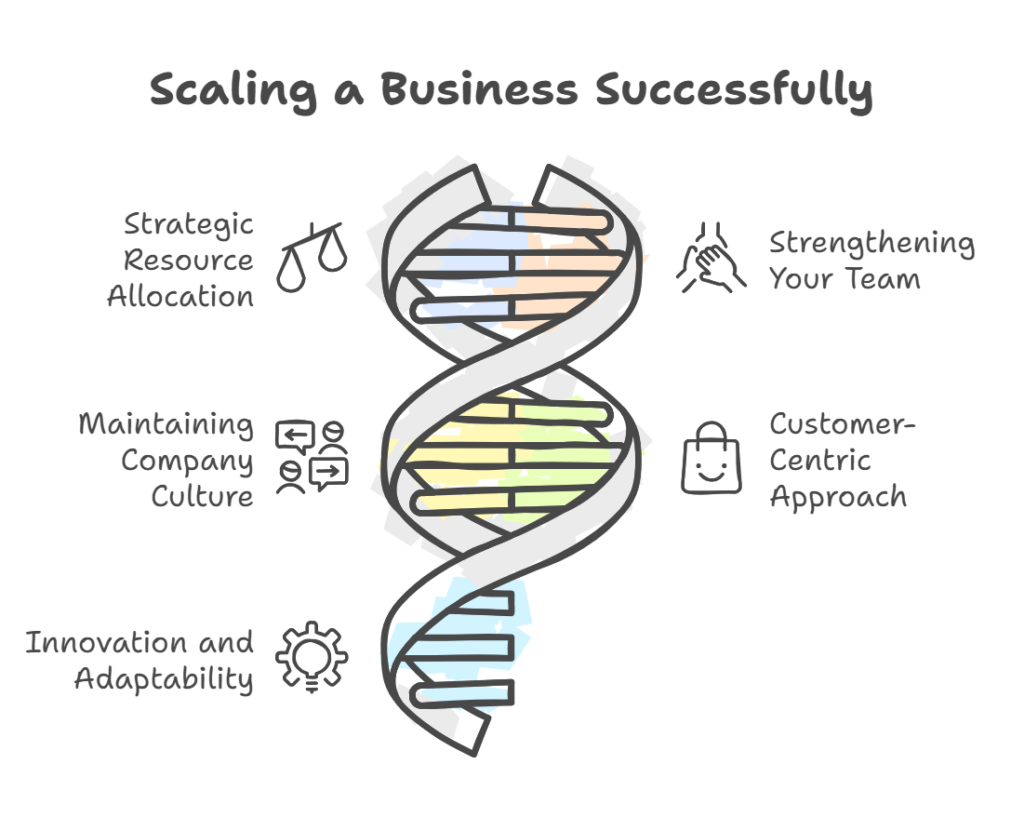Your business is thriving, sales are climbing, your customer base is growing, and your team is hitting its stride. Yet, amid the success, a critical question emerges: Is it time to scale? You’ve worked hard to get to this point, but scaling is a different challenge altogether. It requires careful planning to ensure that growth doesn’t lead to chaos, stretched resources, or a dip in service quality. So how do you approach this next phase strategically, without overwhelming your business?
Scaling isn’t just about doing more, it’s about doing better. It’s about expanding operations efficiently, allocating resources wisely, and ensuring that your growth is built on a strong foundation. Let’s explore key strategies that will help you scale your business effectively, setting you up for long-term success.
Seven Key Strategies To Scale Your Business Successfully

Streamlining Operations
Are You Ready to Handle More?
Let’s say your business is thriving, but you notice that your team is struggling to keep up with increasing demand. Maybe customer orders are getting delayed, or internal communication is starting to break down. This is a common sign that your current systems aren’t built for the next level of growth.
Before you scale, ask yourself: Are my processes efficient enough to handle more volume? One client of mine, a small retail business, faced this exact challenge. Their sales were booming, but they were drowning in manual tasks. By automating order processing and simplifying their fulfillment system, they were able to scale without adding more stress to their team or hiring additional staff.
Strategic Resource Allocation
Where Should You Focus First?
When scaling a business, it’s tempting to try to improve everything at once. But is that realistic? One of the biggest mistakes I see is business owners spreading themselves too thin, trying to grow in every direction. The key is prioritization. Ask yourself, Where will my time, energy, and investment have the greatest impact?
Take, for example, a tech startup I worked with. They were eager to launch multiple new features at once but didn’t have the resources to do so successfully. Instead, they focused on perfecting one key feature, which led to a significant boost in user engagement. By concentrating on what mattered most, they saw more success and built a stronger foundation for future growth.

Strengthening Your Team
Do You Have the Right Talent for Growth?
Scaling a business isn’t just about systems and resources it’s about people. As your business grows, you need a team that’s capable of handling new challenges. Do you have the right people in place, or are there skill gaps that need to be addressed? Investing in talent, whether through hiring or training, ensures that your team is prepared for growth.
One business I worked with faced growing pains when their team couldn’t keep up with increasing demands. By focusing on upskilling their employees and bringing in key hires, they were able to overcome those challenges and build a team that could grow with the business.
Maintaining Company Culture
Is Your Growth Aligned With Your Values?
As businesses scale, there’s a risk that company culture gets lost in the process. With new hires, expanded teams, and rapid changes, it’s easy to lose sight of the values that made your business successful in the first place. Maintaining a strong company culture during growth is critical to keeping your team aligned and engaged.
One client I worked with doubled their staff in under a year but struggled with low morale and high turnover. By refocusing on their core values and fostering a supportive environment, they were able to rebuild trust and maintain a culture that resonated with both new and existing employees. Growth should never come at the cost of your company’s identity.
Customer-Centric Approach
Are You Keeping Your Customers Happy?
adapt when challenges arise As your business grows, are you still able to provide the same level of service that made you successful in the first place? Scaling doesn’t mean losing touch with your customers it means delivering the same (or better) experience to an even larger audience.
One of my clients, an online service provider, noticed a decline in customer satisfaction after expanding their offerings. By refocusing on customer feedback and making small tweaks to their service process, they were able to regain customer trust and increase retention. The lesson here is simple: no matter how big you grow, keeping customers happy is what drives sustainable success.
Innovation and Adaptability
Are You Ready to Pivot?
What if your original plan doesn’t work out the way you expected? Scaling a business means being flexible enough to adapt when challenges arise. Let’s say you launch a new product or service, but it doesn’t resonate with your audience the way you hoped. How quickly can you adjust?
Consider a tech startup I worked with that launched a new app feature, only to realize it wasn’t as user-friendly as they thought. Instead of sticking to the original plan, they pivoted adjusting the design based on user feedback. Within weeks, engagement spiked. Sometimes, growth means knowing when to change direction.
Data-Driven Decisions
Are You Using Data to Guide Growth?
When you’re scaling, relying on gut instinct alone isn’t enough. Data is crucial. Are you tracking the right metrics to make informed decisions? One of my clients, a growing e-commerce business, was overwhelmed by inventory management. By analyzing sales data, they identified their most popular products and optimized stock levels. This move not only increased sales but also minimized waste.
Ask yourself: Am I using data to guide my growth strategy? By focusing on performance metrics, you can make smarter decisions, reduce risks, and seize opportunities more effectively.
Building Strong Partnerships: Who Can Help You Grow?
Scaling doesn’t have to be a solo journey. Who are the key partners or collaborators who can help you grow? One client, a small local business, partnered with a larger, well-known company to co-launch a product. This collaboration immediately gave them access to a wider market and enhanced their credibility.

Think of partnerships as a way to expand your reach without shouldering the entire burden of growth on your own. Ask yourself, Who can I collaborate with to unlock new opportunities?
Ready to Scale?
Scaling your business is about much more than just getting bigger. It’s about growing smarter, staying adaptable, and keeping your customers at the heart of everything you do. By asking the right questions, streamlining operations, and leveraging partnerships, you can ensure that your business scales in a sustainable and meaningful way.
If you’re ready to take the next step, reach out today to explore how my business coaching can help you develop a growth strategy that’s aligned with your goals. Let’s build a plan that drives real results and keeps you moving forward with confidence.
Frequently Asked Questions
How do I know if my business is ready to scale?
You’ll know it’s time to scale when your business consistently meets demand, but your current processes start to feel strained. If customer orders are delayed, team communication is breaking down, or manual tasks are piling up, it’s a sign that your systems need to be streamlined to handle growth effectively.
What should I prioritize first when scaling?
The key to scaling is prioritization. Rather than trying to improve everything at once, focus on areas that will have the biggest impact. This could be improving one key product, optimizing workflows, or investing in customer acquisition anything that strengthens your foundation for long-term growth.
How can I maintain customer satisfaction while scaling?
As your business grows, maintaining or even improving customer experience is critical. Listen to customer feedback, make adjustments as needed, and ensure your team is well-equipped to handle the larger volume. Keeping customers happy will drive retention and fuel sustainable growth.
What role do partnerships play in scaling?
Strong partnerships can be a powerful tool for scaling. Collaborating with complementary businesses or larger companies can give you access to new markets, increase credibility, and share resources allowing you to grow without shouldering all the risk or effort on your own





